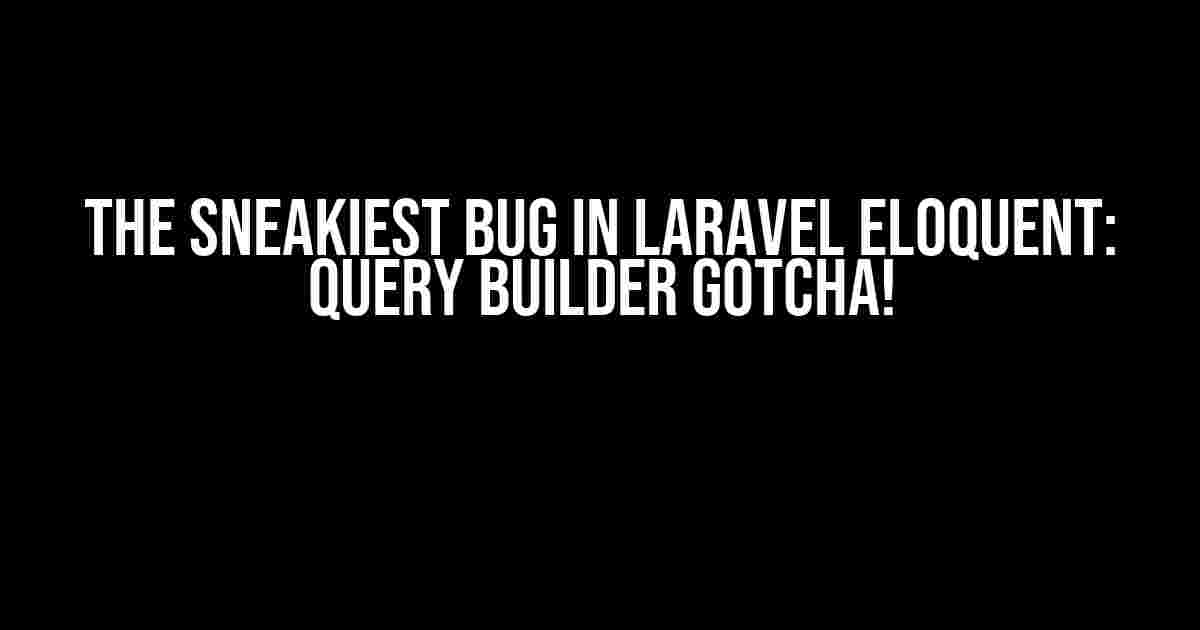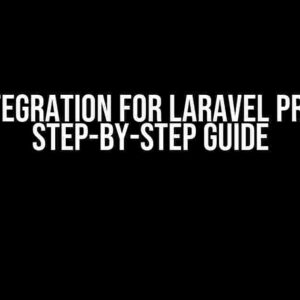If you’re a Laravel developer, chances are you’ve stumbled upon an infuriating issue with Eloquent’s query builder. It’s as if your queries are being possessed by a mischievous entity, ignoring your carefully crafted conditions and constraints. Fear not, dear reader, for you’re not alone! In this article, we’ll delve into the mysterious case of the Bug with Laravel Eloquent query builder and provide you with battle-tested solutions to conquer this pesky issue.
The Problem: Eloquent Query Builder Ignoring Conditions
You’ve written a seemingly flawless query, complete with elegant conditions and constraints, only to find that Eloquent is ignoring them. You’ve double-checked your code, triple-checked, quadruple-checked… yet the result remains the same. Frustration mounts as you wonder if you’ve somehow become incompetent overnight. Don’t worry, friend, it’s not you – it’s Eloquent being its finicky self.
$userQuery = User::where('active', 1)
->where('role', 'admin')
->get();
// Expected result: A collection of active admin users
// Actual result: A collection of all users, regardless of active status or role
The Culprit: MySQL’s SQL Mode
Behind the scenes, Eloquent’s query builder relies on MySQL’s SQL mode. By default, MySQL operates in a tolerant mode, where invalid or ambiguous date and timestamp values are silently ignored. Sounds harmless, right? Well, this “tolerance” leads to the bug we’re discussing.
When you use date or timestamp columns in your Eloquent queries, MySQL’s tolerant mode can cause the conditions to be ignored. This occurs because MySQL is “helpfully” adjusting the invalid dates and timestamps, essentially making your conditions useless.
Solutions to Tame the Beast
Fear not, dear reader, for we’ve got a few aces up our sleeve to tackle this issue! Here are some solutions to get you back on track:
Solution 1: Enable Strict SQL Mode
One way to tackle this bug is to enable MySQL’s strict SQL mode. This will force MySQL to reject invalid dates and timestamps, making your conditions more reliable.
// In your database configuration file (config/database.php)
'mysql' => [
// ...
'strict' => true,
// ...
],
// Alternatively, you can set the SQL mode dynamically
DB::statement("SET SESSION sql_mode = 'NO_AUTO_CREATE_USER,NO_ENGINE_SUBSTITUTION'");
Note that enabling strict SQL mode might break some of your existing queries, so be sure to test thoroughly.
Solution 2: Use Carbon’s Parsable Dates
Certain date and timestamp formats can be problematic in Eloquent queries. To avoid this, use Carbon’s parsable dates to ensure your dates are in a consistent, MySQL-friendly format.
use Carbon\Carbon;
$userQuery = User::where('created_at', '>=', Carbon::parse('2022-01-01')->format('Y-m-d H:i:s'))
->where('role', 'admin')
->get();
By using Carbon’s `parse()` method, you can ensure your dates are in a format that MySQL can understand.
Solution 3: Use Raw Expressions
In some cases, using raw expressions can help bypass the problematic SQL mode. Be cautious when using raw expressions, as they can make your code more vulnerable to SQL injection attacks.
$userQuery = User::whereRaw("DATE(created_at) >= '2022-01-01'")
->where('role', 'admin')
->get();
Raw expressions can be useful, but make sure you’re properly sanitizing your input data to avoid potential security risks.
Conclusion
In conclusion, the Bug with Laravel Eloquent query builder is a pesky issue that can drive even the most seasoned developers crazy. By understanding the underlying cause (MySQL’s tolerant SQL mode) and implementing the solutions outlined above, you’ll be well-equipped to tackle this problem and write more reliable Eloquent queries.
Remember, when it comes to debugging, it’s essential to stay calm, methodical, and patient. Don’t be afraid to experiment, and always keep your code clean and concise. Happy coding, and may the bug-bashing force be with you!
| Solution | Description |
|---|---|
| Enable Strict SQL Mode | Force MySQL to reject invalid dates and timestamps |
| Use Carbon’s Parsable Dates | Ensure dates are in a consistent, MySQL-friendly format |
| Use Raw Expressions | Bypass problematic SQL mode, but be cautious of SQL injection risks |
- Check your MySQL version and configuration
- Verify your Eloquent query syntax and logic
- Test your query with different date and timestamp formats
- Consult the Laravel documentation and community resources
By following these guidelines and solutions, you’ll be well-equipped to conquer the Bug with Laravel Eloquent query builder and write more reliable, efficient queries.
Frequently Asked Question
Get quick answers to the most common issues with Laravel Eloquent query builder!
Why is my Eloquent query not returning any results?
Make sure to check the query log to see the actual SQL query being executed. You can do this by using the `DB::enableQueryLog()` method. Then, check if the query is correct and if the data exists in the database. Also, ensure that the query is not being cached by using the `disableQueryLog()` method.
How can I debug an Eloquent query?
You can use the `dd()` or `dump()` function to inspect the query and its bindings. For example, `$query->dd()` or `$query->dump()`. This will output the SQL query and its bindings to the screen. Alternatively, you can use a package like Laravel Debugbar to visualize the query and its execution time.
Why is my Eloquent query taking too long to execute?
Check the query’s execution time by using the `DB::enableQueryLog()` method and then inspecting the query log. Look for slow queries and optimize them by adding indexes to the columns used in the WHERE, JOIN, and ORDER BY clauses. Also, consider using eager loading to reduce the number of queries executed.
How can I prevent SQL injection in Eloquent queries?
Eloquent’s query builder uses parameter binding to prevent SQL injection. When you use the `where` method, for example, the value is automatically bound to the query as a parameter. This ensures that the value is treated as a string and not as part of the SQL query. Therefore, you don’t need to worry about escaping or sanitizing the input values.
Can I use raw SQL in Eloquent queries?
Yes, you can use raw SQL in Eloquent queries using the `whereRaw` or `selectRaw` methods. However, be careful when using raw SQL, as it can expose your application to SQL injection attacks if not used properly. Make sure to escape and sanitize any user-provided input values.





